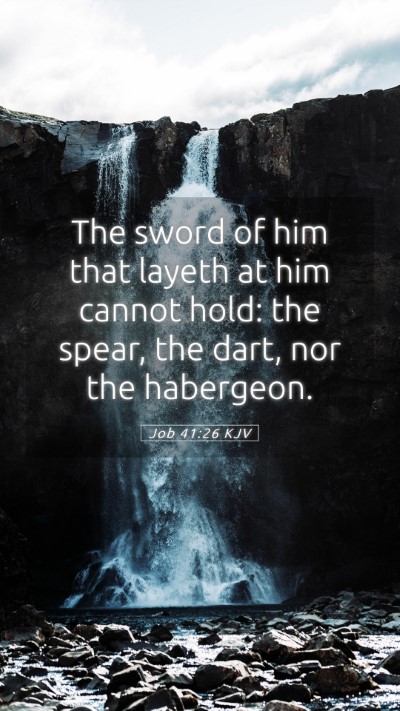Understanding Job 41:26
Job 41:26 states, "The sword of him that layeth at him cannot hold: the spear, the dart, nor the habergeon." This verse is part of God's discourse to Job, emphasizing the unparalleled strength and fierceness of the creature described, commonly believed to be the leviathan. The verse serves as a reminder of God's immense power in comparison to the limitations of human weapons.
Context and Background
The Book of Job is a profound exploration of suffering, justice, and the nature of God. Chapter 41 marks the climax of God's response to Job's questions about his suffering and the justice of God. By describing the leviathan, a creature of immense power and untamable nature, God illustrates His sovereignty over creation and highlights the futility of human attempts to withstand or control such power.
Verse Meaning and Analysis
The insights from various public domain commentaries provide a rich understanding of this verse:
-
Matthew Henry on Job 41:26:
Henry emphasizes that the sword represents human might and effort. He notes that even the most robust instruments of war are ineffective against the leviathan, symbolizing the limits of human strength when confronted with God's creation. He reflects on how this serves as a metaphor for the futility of opposing God's power.
-
Albert Barnes' Commentary:
Barnes suggests that the verse underscores the idea that no weapons fashioned by man can subdue the leviathan, further hinting at the creature’s divine creation and purpose. He elaborates that this illustrates God's unmatched might, reminding Job of the vast gulf between divine and human power.
-
Adam Clarke's Commentary:
Clarke points out that the leviathan can withstand any form of attack from human weapons. He connects this with the larger theme of God’s control over even the most chaotic elements of nature. Clarke discusses the implications of God's omnipotence, showing that even in opposition, humans cannot prevail.
Applications for Bible Study
When studying this verse, it is essential to reflect on the broader implications regarding God's sovereignty and the limitations of human authority. This can be applied in various aspects of life, particularly in recognizing that our struggles may sometimes seem insurmountable, but they are minuscule in the context of God's power.
Practical Lessons
-
Trusting God's Power:
Believers are called to trust in God's power and ability to handle challenges that seem greater than themselves.
-
Humility in the Face of Divine Authority:
This verse teaches humility, reminding us that our understanding and capabilities are limited when compared to God’s eternal wisdom and strength.
-
Understanding Spiritual Warfare:
The imagery of weapons failing against the leviathan can be likened to the spiritual battles believers face, encouraging reliance on God’s might rather than self-reliance.
Related Bible Cross References
- Psalm 74:14 - Discusses God's power over the leviathan.
- Isaiah 27:1 - Mentions the slaying of leviathan, symbolizing chaos.
- Job 40:15-24 - Further descriptions of another powerful creature, Behemoth.
Conclusion
Job 41:26 serves as a powerful reminder of God's authority over creation and the futility of human efforts to combat the divine will. For those seeking to delve into bible verse meanings and bible verse interpretations, this passage provides rich material for bible study insights, enhancing one's understanding of scripture.


